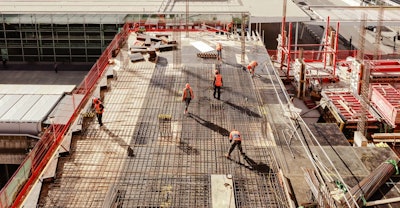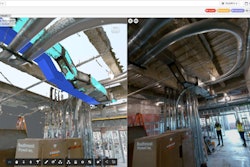
The U.S. construction industry employs almost 10 million people. A typical home construction crew comprises between 26 and 32 workers. But large projects may have hundreds of crew members.
Builders, plumbers, electricians, and machine operators work on-site at any given time. Managing such a large and diverse crew can be challenging. So is keeping tabs on several small crews scattered across many sites.
Crew management in construction calls for prudent leadership. It should center around efficiency, camaraderie and results. A manager must also mind costs, schedules, communication, logistics, and safety.
Managing a construction crew is a high-stakes game with lots of moving parts.
Essentials of Construction Crew Management
Crew management in construction means organizing and coordinating workers. It entails overseeing them on-site and scheduling their shifts. Management also means tracking progress, ensuring safety, and monitoring spending. Managers collaborate with stakeholders like subcontractors, engineers, architects, and suppliers.
But let’s dig even deeper. Let's explore the core principle of construction crew management. What is crew management all about, and why is it important?
Fostering Teamwork
Henry Ford famously said, “Coming together is the beginning. Keeping together is progress. Working together is success.” This couldn’t be truer in construction work.
The importance of collaboration cannot be overstated.
A construction crew is a group of laborers. Each has unique skills, experience, and capabilities. But a good crew is more than the sum of its parts. It takes confident leadership to bring different talents together. With successful management, individuals form a functional unit.
Communicating Effectively
Clear communication is essential when running a construction crew. Each crew member must understand their responsibilities and expectations. They must work well within a project as well as the parent company.
Open communication encourages members to voice their concerns. They can provide feedback and connect with coworkers.
It also keeps everyone on the same page. The flow of information is what binds a construction crew together.
Meeting Expectations
The principles of crew and project management often overlap. After all, their goals are similar. For instance, a crew must understand expectations to deliver results.
They must understand timeframes and deadlines. But quality standards are equally important. It's best to make this clear before beginning work.
Setting expectations from the get-go establishes accountability.
Maximizing Efficiency and Productivity
Most construction projects go over their budgets and deadlines. According to a 2020 National Construction Payment Report, only 28% of contractors say they finish projects on time and on budget.
There are many reasons for cost and budget overruns. Inefficient labor management is at the top of the list. That makes sense, given that labor costs can be 30%-40% of the total budget. Plus, a poorly managed crew can cause delays.
The point is, proper crew management plays a significant role in optimizing work efficiency, reducing costs and time overruns, and maximizing productivity.
Promoting Safety
Working on a construction site is a pretty dangerous gig. Large loads, power tools, heavy machinery, loud noises, and debris are a danger to workers.
Fatal injuries can, and do, happen on a construction site. The U.S. Bureau of Labor Statistics states that more than one in five workplace deaths happened in 2020. This industry alone accounted for 46.1% of all fatal falls in 2020.
The danger is a matter of managing risks. Proper training, use of safety gear, and worksite coordination can help reduce injuries.
Meeting Industrial and Legal Compliance
Part of crew management is ensuring that labor regulations are met. The Fair Labor Standards Act (FLSA) and Occupational Safety and Health Administration (OSHA) are two guides to follow.
Most related laws and standards address safety and compensation. Upholding them protects your company from legal action. It also certifies your crew to work on various kinds of construction projects.
What Is Construction Crew Management Software?
Construction crew management software is exactly what it sounds like. It helps construction project managers and contractors run teams more effectively. It digitizes critical crew and project management tasks such as:
- Work scheduling and delegating
- Progress tracking
- Crew communications
- Gathering performance insights
- Recruiting and onboarding new crew members
- Accounting and budgeting
- Compliance management
- Resource usage
- Payroll management
- Omit HR oversight
Crew management software is a powerful tool. It can streamline crew operations, track individual activities, and boost productivity. It can also cut out mistakes in paperwork. Moreover, most digital solutions are web- or cloud-based. That enables managers to supervise teams on different sites without visiting each one.
6 Tips for Effective Construction Crew Management
Keeping the importance of crew management in mind is a key part of any strategy. So is having a plan. Here are six practical tips for a large-scale crew management plan.
Hire the Right People
First things first. Make sure your crew is made up of the right people. Construction work is demanding. You can’t just hire every Tom, Dick, and Harry. First, you must check their credentials. You need to ensure they qualify for specific roles.
Second, evaluate their soft skills to see if they’d be a good fit. Here are some of the essential soft skills you should look for in a construction crew worker:
- Playing well with others
- Active listening
- Planning, organizational, and time management skills
- Concern and appreciation for safety
- Willingness to follow instructions
Provide All the Necessary Resources for the Job
Ensure your construction workers have all the necessary equipment to do their job. Not only that, each machine, tool, or bit of safety gear must be in tip-top shape.
Sending the crew out with inadequate, damaged, or outdated gear damages crew morale. It makes the job harder and compromises workplace safety.
That, in turn, can damage your reputation.
Offer Meaningful Incentives, Rewards, and Benefits
Working on a construction site is not easy. Sometimes the $18.16 mean hourly wage is barely enough to make up for the backbreaking work.
Fair compensation is a good start. Showing extra appreciation for your crew can help attract quality workers.
Meaningful rewards can go a long way toward raising morale. Gift cards, paid time off, and bonuses are all ways to show you appreciate them. It also makes them more likely to work hard and stay safe.
Cultivate a Safety-First Workplace Culture
Make safety a top priority within the crew. This means regular safety training and briefs, and enforcing protocols. Developing a safety-first culture helps with compliance. It also shows that you value your staff.
Fewer worksite accidents and injuries mean fewer interruptions, delays, and costs.
Get the Crew Involved in Project Management Decisions
Encourage crew members to weigh in on important decisions about their job. Allowing them to take part in decision-making is part of employee involvement.
Being heard gives workers a sense of value and belonging in the company.
Employee involvement is effective problem-solving that also minimizes friction to change. Construction workers might have valuable insights and suggestions about project management issues. After all, they literally have their boots on the ground.
Go Digital
Managing a large crew using pen and paper is error-prone and sometimes next to impossible. But a robust digital system makes crew management easier, faster, and more convenient. It gives you a bird’s-eye view of the entire crew.
Plus, you can track progress, job satisfaction, and other project metrics in real-time from your computer or smartphone.
As a manager, your construction crew is your lifeblood. Managing them effectively will keep your projects flowing seamlessly.
If you're ready to become a better construction manager, now is the perfect time to start. Here are some tips to get you going:
1. Consider your management style. Play to your strengths. What is most important to you in completing a project? How can you, personally, make that happen?
2. Find construction management software that simplifies management tasks. If possible, try out some different solutions before you decide what works best for you.
3. Create a management plan. How do you plan to keep to your proposed budget and timeframe? Plan it out step by step. Use your management software to help you stay on track.
4. Communicate with your crew. If you've made any changes due to your revised approach, make sure you communicate with your crew.




















